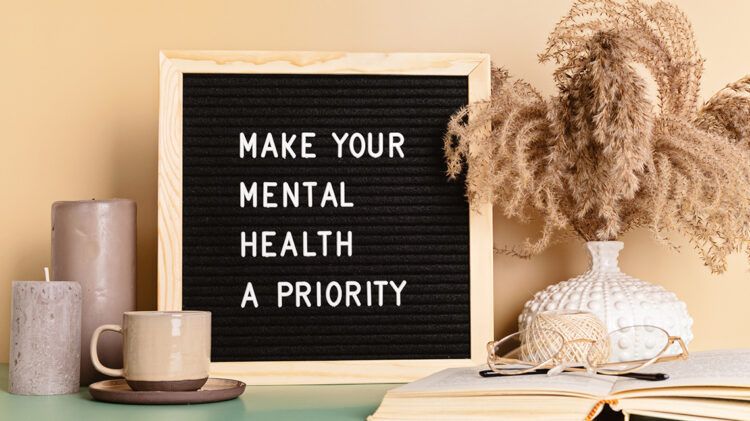
Mental Health 101
Making your inner peace a priority
May 23, 2023Making your inner peace a priority
May 23, 2023It’s Mental Health Awarenessmonth, a time dedicated to raising awareness, decreasing stigma and educating the public on all things to do with our mental health. It’s also an opportunity to celebrate self-care and understand what it means to be mentally healthy, while learning how to nurture this equilibrium within ourselves.
Mental Health Awareness month has been recognized since 1949, started by Mental Health America to spread the word that mental health is something that we should all care about. It was created to be a catalyst to learn more, seek help, offer (and ask) for support and initiate vulnerable conversations. It assists in the changing of attitudes, encouraging us to have more compassion towards mental illness ─ both in others and in ourselves.
So, what do we mean when we speak of Mental Health?
Your health is one of the most important aspects of life, yet in the past our mental health was something that was often overlooked and poorly understood. Luckily, the discussion and awareness around mental health and psychological well-being continues to expand.
Mental health encompasses your emotional, social and psychological well-being and affects how you think, feel and behave, influencing how you handle stress and make choices.
There are many factors that can increase the risk of developing a psychological disorder, including abuse, the environment, genetics, lifestyle, and traumatic events. It is important to be able to assess your own mental state and recognize the signs of deterioration or worsening mental health. Common indicators can include persistent sadness, changes in sleep patterns, loss of interest in things that normally make you feel excited or happy, excessive anxiety or fear, sudden (and severe) mood swings, changes in eating habits, a noticeable shift in energy levels, feeling persistent despair or hopelessness, thinking about self-harm or being unable to perform daily tasks.
Just like your physical well-being, your mental welfare is not static; it’s a continuum that fluctuates. And it’s also not the absence of mental disorder, as defined by the World Health Organization, but rather a state of well-being in which you can sufficiently cope with the stresses of life.
How to Stay Mentally Healthy
As with any aspect of your health, your mental well-being is something that needs daily care and attention. Fortunately, as mental health becomes more and more widely discussed and researched, there is a growing number of evidence-based options to support you in maintaining your mental well-being:
- Therapy ─ find a counselor, therapist or psychologist who can provide a safe space for you to unpack and explore your mental and emotional processes. Seeking this support can really be a game-changer when it comes to maintaining a healthy mental state
- Support Groups ─ connecting to others who struggle with similar issues can be incredibly helpful. Finding support networks where you can share experiences and receive empathy can help foster a sense of belonging and promote healing
- Get Active ─ whether taking a walk, hitting the gym, or playing a sport on a team, find a physical activity you enjoy and then integrate it into your life. Staying active and physically healthy has a remarkable impact on your mental state
- Self-Help Resources ─ more than ever before, there are so many amazing resources available to support and empower us along our mental health journey. From self-help books to meditation apps, online courses, and podcasts to health websites and forums, there is a wealth of information at your fingertips that can supplement professional help and help you to take a more active role in your well-being
- Lifestyle Changes ─ this can look like prioritizing rest and sleep, minimizing alcohol and drug intake, and maintaining a healthy diet including plenty of whole foods, fruits and vegetables; all of these healthy habit swaps have a ripple effect into your physical, mental and emotional health
- Online Info ─ finding reliable sources of content online about mental health on social media (yes even TikTik and Instagram) can help make your scrolling that much more uplifting and educational
- Take Care of Yourself ─ this one is essential. Dedicate yourself to the cultivation of strong, proactive self-care practices that help you to feel your best. This can also look like exploring boundaries and saying ‘NO’ to things that aren’t good for your health. Learn to prioritize this nurturing…
- Meditation ─ yes, you’ve probably heard it before, but truly mediation is one of the few things that can radically transform your mental state and outlook on the world. Download an app, join a course, or just set a timer and sit for a few minutes every day and see for yourself
- Medication ─ in some cases, medication can offer relief from symptoms related to mental illness. These should always only be prescribed by a qualified psychiatrist or medical professional
At PUMA we care for mental health because it is a prerequisite for motivation, satisfaction and performance and therefore we provide empathic support and regular interesting trainings about work-life-balance.
Destigmatization Discussion
While the conversation surrounding mental health has certainly become much more open and compassionate over the decades, societal stigma still persists. This lack of understanding associated with mental illness is one of the highest barriers that prevents people from seeking help, disproportionately impacting those who live with mental health conditions.
Stigma creates a mark of shame and has a distinct sense of othering. It fuels the idea of ‘not being okay’ or not being ‘normal’ if you are struggling with your mental health. That is why it is so important to challenge and dismantle these concepts ─ both internally, within ourselves, and externally as a culture.
Ultimately education, open dialogue and raising awareness around mental health (exactly what this month is all about) is a great way to normalize conversations around mental health and encourage empathy and support. Seeking help is a signal of strength, not weakness.
Compassion Cures
We all experience a wide spectrum of moods and emotions. This is normal and natural ─ it is what makes us human. By maintaining a mindset of compassion and curiosity, prioritizing self-care and learning more about your psyche you can help yourself to work through your thought patterns and emotions from a more empowered place.
Understanding that everyone has fluctuations and everyone goes through internal difficulties can also help you to realize you are not alone and encourage you to speak out and share what is going on inside of you, especially if you feel like you are struggling.


